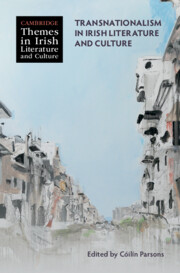Book contents
- Transnationalism in Irish Literature and Culture
- Cambridge Themes in Irish Literature and Culture
- Transnationalism in Irish Literature and Culture
- Copyright page
- Contents
- Acknowledgments
- Contributors
- Introduction: A Weak Theory of Transnationalism
- Part I Transnational Genealogies
- Part II Planets
- Part III Missed Translations
- Chapter 10 Sounding Authentic: Renditions of Central and Eastern European Literature by Irish Writers
- Chapter 11 Irish Literature, (Irish-)American Culture, and “Hiberno-American Blandness”
- Chapter 12 Ngundalehla Godotgai: A Bundjalung Version of Waiting for Godot
- Part IV Transnational Futures
- Select Bibliography
- Index
Chapter 10 - Sounding Authentic: Renditions of Central and Eastern European Literature by Irish Writers
from Part III - Missed Translations
Published online by Cambridge University Press: 13 November 2024
- Transnationalism in Irish Literature and Culture
- Cambridge Themes in Irish Literature and Culture
- Transnationalism in Irish Literature and Culture
- Copyright page
- Contents
- Acknowledgments
- Contributors
- Introduction: A Weak Theory of Transnationalism
- Part I Transnational Genealogies
- Part II Planets
- Part III Missed Translations
- Chapter 10 Sounding Authentic: Renditions of Central and Eastern European Literature by Irish Writers
- Chapter 11 Irish Literature, (Irish-)American Culture, and “Hiberno-American Blandness”
- Chapter 12 Ngundalehla Godotgai: A Bundjalung Version of Waiting for Godot
- Part IV Transnational Futures
- Select Bibliography
- Index
Summary
Over the past century there have been numerous Irish translations of literature from central and eastern European countries that are reworkings of existing English versions. This chapter focuses on examples of this phenomenon produced by three notable writers: Seamus Heaney’s work on Leoš Janáček’s song cycle, Diary of One Who Vanished (1999), Flann O’Brien’s Rhapsody in Stephen’s Green (a 1943 rendering of Karel and Josif Čapek’s Ze života hmyzu/The Insect Play), and Brian Friel’s versions of Anton Chekhov’s Three Sisters (1981/2008). The original texts have very little in common with each other, thematically or stylistically, and these translations reflect this diversity. However, they are all characterized by acts of domestication as, in a variety of ways, the three translators infused their renderings with Irish notes in order to distinguish them from the standard and British English versions that informed their creation. In this light, these translations operate almost entirely in English language and cultural terms, and speak more to the position of Irish literature in the Anglosphere than to its relationship with central and eastern European cultural worlds.
Keywords
- Type
- Chapter
- Information
- Transnationalism in Irish Literature and Culture , pp. 189 - 206Publisher: Cambridge University PressPrint publication year: 2024

